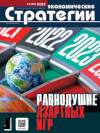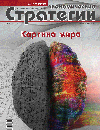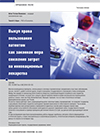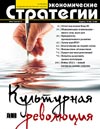Innovation Economy Clustering: Strategic Issues of Development
DOI: 10.33917/es-4.190.2023.72-77
Conditions prevailing in the Russian economy in 2023 presuppose an increased role of indirect forms of state support for business, where the state acts as a curator, nourishing small businesses with the help of analytical support. An optimal institution for implementing such a support policy is the innovation cluster, due to the formation in the process of “cooperation — competition” of a group of interrelated enterprises that can compete with large companies in innovation markets. Based on the patent analysis, it is shown that Russia has a significant development potential, and innovation clusters should focus on developing those technological areas that are most promising for their target development model.
References:
1. Bychkova O., Gladarev B., Kharkhordin O., Tsinman Zh. Fantasticheskie miry rossiiskogo khai-teka [Fantastic Worlds of Russian High-Tech]. Saint Petersburg, Izd-vo Evropeiskogo universiteta v Sankt-Peterburge, 2019, 416 p.
2. Prirost vysokoproizvoditel’nykh rabochikh mest [Growth of High-Performance Jobs] // Federal’naya sluzhba gosudarstvennoi statistiki, available at: https://rosstat.gov.ru/storage/mediabank/vprm-2017-2021.xls.
3. Kostin S.V. Innovatsionnyi klaster kak institut razvitiya innovatsionnoi ekonomiki Rossii [Innovation Cluster as an Institution for Development of Russia’s Innovation Economy]. Ekonomicheskie strategii, 2022, vol. 24, no 3, pp. 64–69, DOI: https://doi.org/10.33917/es-3.183.2022.64-69.
4. Chang Kha-Dzhun. S”edobnaya ekonomika. Prostoe ob”yasnenie na primerakh mirovoi kukhni [Edible Economy. A Simple Explanation on Examples of World Cuisine]. Moscow, Mann, Ivanov i Ferber, 2023, 337 p.
5. Andrews D., Criscuolo Ch., Gal P. Frontier Firms, Technology Diffusion and Public Policy: Micro Evidence from OECD Countries. OECD Productivity Working Paper, 2015.
6. Grachev I.D., Nekrasov S.A. Opora na natsional’nuyu innovatsionnuyu sistemu kak neobkhodimoe uslovie realizatsii natsional’nykh proektov [Reliance on the National Innovation System as a Necessary Condition for Implementing National Projects]. Vestnik Rossiiskoi akademii nauk, 2020,
vol. 90, vol. 8, pp. 714–725.
7. Kostin S.V. Innovatsionnyi klaster kak institut organizatsii konkurentsii v usloviyakh ekonomicheskoi rekonstruktsii [Innovation Cluster as an Institution for Organizing Competition in the Context of Economic Reconstruction]. Problemy teorii i praktiki upravleniya, 2022, no 4, pp. 140–152.






